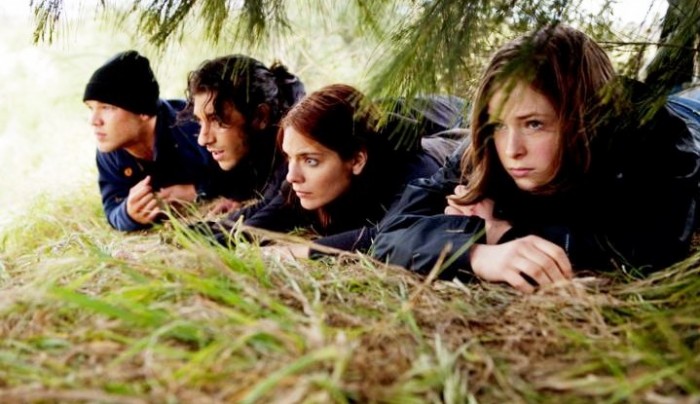 We all love seeing a good Aussie film. That’s what the anti-piracy lobby tells us at the start of every DVD, Blu-ray or cinema session we see. Yet since the start of 2010, only one Australian film – Tomorrow, When the War Began – has managed to reach the Number 1 spot in the box office charts, and it only did so for a week before making a total of $9.2 million. Rounding up the Top 3 were Bran Nue Dae ($7.56 million) and the critically acclaimed Animal Kingdom ($5.2 million). Compare this with the $9.6 million Avatar made in its first week at the Australian box office (and well over $100 million total locally), and one starts to get a picture of just how much proportional love Australians have for a good Aussie film. Indeed, with the exception of the aforementioned Tomorrow, When the War Began, not a single film produced outside the United States topped the Australian box office in 2010, and it was a fabulous year for Aussie film.
We all love seeing a good Aussie film. That’s what the anti-piracy lobby tells us at the start of every DVD, Blu-ray or cinema session we see. Yet since the start of 2010, only one Australian film – Tomorrow, When the War Began – has managed to reach the Number 1 spot in the box office charts, and it only did so for a week before making a total of $9.2 million. Rounding up the Top 3 were Bran Nue Dae ($7.56 million) and the critically acclaimed Animal Kingdom ($5.2 million). Compare this with the $9.6 million Avatar made in its first week at the Australian box office (and well over $100 million total locally), and one starts to get a picture of just how much proportional love Australians have for a good Aussie film. Indeed, with the exception of the aforementioned Tomorrow, When the War Began, not a single film produced outside the United States topped the Australian box office in 2010, and it was a fabulous year for Aussie film.
As part of his Oz Film Blogathon, film journalist Scott Henderson has asked us to blog about the ‘Things We Think But Do Not Say’. Those who know me would ponder whether there is any thought that passes between my ears that isn’t verbalised, and when it comes to the state of the Australian film industry, there are few that haven’t weighed in with their two cents on the state of play of the Aussie film industry. Opinions range from “a thriving industry that need more promotion” to “Industry? WHAT industry?”. The truth lies somewhere in between in reality, with Australian films clearly not getting the attention that it needs in the country that produces it. There has always been a cultural cringe in Australia towards our own product, and a perceived lack of adventure in terms of genre exploration, from the suburban angst of 2001’s Lantana to the angsty suburban couple in India for 2010’s The Waiting City or the ‘fish out of water dramas’ such as the bland The Tree and the paint-by-numbers South Solitary.
 Yet with a few familiar films cropping up, this argument really doesn’t hold for 2010. We have had one of the most eclectic years on record, with such gems as the schlock-comedy The Loved Ones, the underrated western-cum-horror film Red Hill, musical Bran Nue Dae, the highly decorated (suburban) crime drama Animal Kingdom, romantic drama Summer Coda, ultra-violent revenge thriller The Horseman, comedy (*cough*) Wog Boy 2: The King of Mykonos, bromantic comedy I Love You Too, the ‘love story that breaks all the rules’ Matching Jack and World War I film Beneath Hill 60. Now, it will come as no surprise to observers of the industry that these films failed to make as much as their US cousins, but in the case of some films, the lack the box office was a particular disappointment. Let’s take The Loved Ones as an example. This is a film that appeared to have a ready-made cult audience, and a sense of humour and gore-levels to match the demands of said audience. I don’t know about the rest of the states, but you couldn’t turn around in Sydney without seeing the side of a bus that had a massive advertisement for the film splashed all of the side.
Yet with a few familiar films cropping up, this argument really doesn’t hold for 2010. We have had one of the most eclectic years on record, with such gems as the schlock-comedy The Loved Ones, the underrated western-cum-horror film Red Hill, musical Bran Nue Dae, the highly decorated (suburban) crime drama Animal Kingdom, romantic drama Summer Coda, ultra-violent revenge thriller The Horseman, comedy (*cough*) Wog Boy 2: The King of Mykonos, bromantic comedy I Love You Too, the ‘love story that breaks all the rules’ Matching Jack and World War I film Beneath Hill 60. Now, it will come as no surprise to observers of the industry that these films failed to make as much as their US cousins, but in the case of some films, the lack the box office was a particular disappointment. Let’s take The Loved Ones as an example. This is a film that appeared to have a ready-made cult audience, and a sense of humour and gore-levels to match the demands of said audience. I don’t know about the rest of the states, but you couldn’t turn around in Sydney without seeing the side of a bus that had a massive advertisement for the film splashed all of the side.
Getting back to the piracy question, it seems that it gets a chunk of the blame, with a list of crimes longer than Wikileaks‘ Julian Assange. Indeed, film piracy has been blamed for everything from robbing the industry of income to funding terrorism! It could be argued that film piracy robs the rightful profits of filmmakers and local distributors, and the perplexing Accidental Pirate spends a fair bit of time and effort pointing this out to us. However, I hate to break it to people, but the number of illegal bit-torrents for the US studio-produced Inception takes over 11 pages of PirateBay, while a search for Tomorrow When the War Began fails to return any hits. Inception still seems to be doing well for itself at the box office and on DVD/Blu-ray despite this rampant piracy. Now while I recognise that this is an over-simplistic analysis of the impact of film piracy, which may impact our smaller industry, it would be equally simplistic to solely place the blame on it for the declining distributor profits. Competing demands for consumer attention, a bigger global film industry than ever before, the rising cost of cinema tickets and shorter windows between cinema and home release are all contributing factors to the generally declining box office takings. Indeed, this entire argument lies on the assumption that if a punter can’t get something for free, they would pay for it. It’s not that simple, and there is no empirical evidence to suggest otherwise.
So how does the Australia industry, which largely relies on government subsidies to exist, avoid making costly flops on the taxpayer dime? Back in 2005, Disney CEO Bob Iger suggested that their monolith was “spending too much time chasing box office (dollars) and we are waiting too long to enter the next window where a movie has the most value”. He added to this that “a deal where the exhibitor would sell the DVD of a Disney movie playing in the theater – while it’s still fresh in audience members mind – and cut the theater owner in for a piece of the sale”. Here we are in 2010, and it remains a wonderful and revolutionary and completely untapped idea five years on. Imagine applying this to the Australian film industry? Australians walking out of a cinema, buoyed by the buzz of a country bridge being blown up or a cold-blooded gangland retribution to find the very film they’ve just seen available to them on DVD or Blu-ray in the lobby.
How about getting even more radical on this? Lobby the same bodies that fund the films to subsidies the tickets as well. Ticket prices are now, on average, between $15 and $22 (more for the Aussie-voiced 3D IMAX Legend Of The Guardians: The Owls Of Ga’Hoole) for a full price, making it a very expensive proposition to see a local film. On a limited budget, one will inevitably choose the big budget brain candy from the US, because the advertising has been so constant on all forms of media. Yet what if the ticket prices were more attractive? What if some of the government funding that went into supporting the local industry subsidised cheaper tickets for Australian films? Get the schools in on mass-discount to see films like Samson and Delilah, and offer an educational program to go with it. Offer combos: ticket and DVD for $30, for example. Once again, it may be overly simplistic, but perhaps it is this kind of thinking that will lead Australians to choose Australian cinema first at the box office. Who knows, they might find a movie they’d love seeing…again and again.




